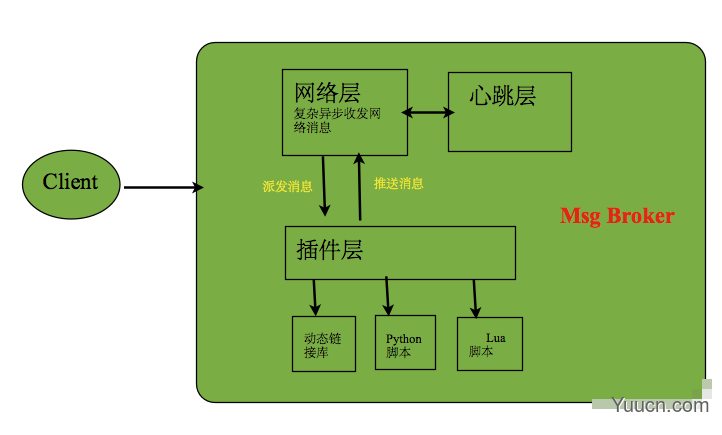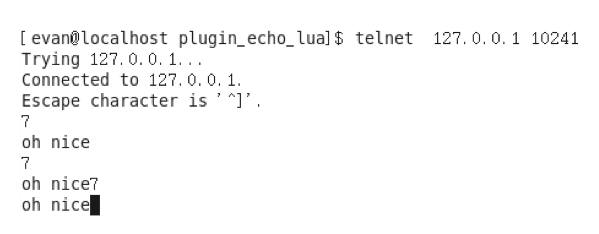支持插件的消息中间件【msg broker with plugin】
支持插件的消息中间件
msg broker with plugin
Msg Broker概念:
msg broker是实现application 之间互通讯的组件。通常为实现application之间的解耦,消息都是通过msg broker完成转发。application只需知道其他applicatipn的逻辑名称,而不需要知道对方的具体位置。Broker中维护一个查找表,记录着哪个application注册在此逻辑名称之下,所以消息总是会被正确的投递到目的地。
msg broker不限于1-1的转发,也支持1-N的模式。其主要功能有:
- 实现多个application的互通讯,而隐藏彼此的位置
- 实现消息个格式的转换,如json to bin
- 安全控制,msg broker可以再转发消息前进行一定程度的安全验证
- 增大系统的可伸缩性,由于application通讯的目标变成了逻辑结点,而该逻辑结点可以对应多个物理结点,理论上可以动态的增加物理结点,来扩展该逻辑结点的吞吐量。
- msg broker可以用来集成服务,并且可以暴楼服务的部分接口
msg broker 具有的缺点是:
- 增加了复杂性,多了一层转发
- 可维护性降低,需要理清msg broker和各个application和服务的关系。
- 降低性能,主要是实时性能下降了,消息需要多转发一边,单次请求的延时大大增加了。
当前流行的Broker的特点和缺点:
Msg Broker的结构:

流行的Broker中间件介绍:
- RabbitMQ
项目地址:http://www.rabbitmq.com/
RabbitMQ是由Erlang开发的以高效、健壮以及高度伸缩性的消息服务器。其所包含的概念有Producer、Consumer、Exchange、Queue。RabbitMQ基于QMQP协议,支持的语言也非常丰富,文档也非常清晰。使用RabbitMQ可以实现订阅发布模型、RPC模型、路由模型等,参见RabbitMQ的例子:http://www.rabbitmq.com/getstarted.html。
但是它有如下局限性:
- RabbitMQ 没有针对连接做控制,它是为高效而生,它对外来的请求是信任的,不存在安全验证,如任何一个client都可以创建消息队列,所以RabbitMQ一定是放在内网的。
- 使用RabbitMQ ,我们是通过Client远程操作RabbitMQ,不能定制RabbitMQ的功能。
- ZeroMQ
项目地址:http://www.zeromq.org/
ZeroMQ是一个Socket封装库,号称是最快的消息内核。ZeroMQ可以支持TCP、UDP、IPC等多种通讯协议。ZeroMQ可以实现的通讯模型就更多了,几乎涵盖了消息通讯的所有模式,参见官网介绍http://www.zeromq.org/intro:read-the-manual 。
其局限性为:
- ZeroMQ虽然封装了消息传输的复杂性,但是它也隐藏了连接的建立、断开等过程。ZeroMQ传输消息更像是udp数据报,使用者不能知道对方何时连接建立、何时连接断开。
我们需要一个不一样的Broker
应用场景介绍
在网络游戏中,cliet和服务器是通过tcp长连接的。相对于HTTP+WebServer的不同在于:
- client连接到服务器,需要进行身份验证,通常是client第一个消息包含身份验证数据如用户名密码等,而验证通过后该连接为可信任连接。
- client 任意时间都可以向服务器发送请求,而不需要服务器立即返回,同样,服务器是在任意时间(当然会有实时性等约束)都可以像client推送消息。
- client断开连接时,服务器必须捕获该事件,以便完成一些数据清理操作。
- client对应的一般是个集群,但是client无从得知细节,因为它只连接最外层的一个,给他取个名字“MsgBroker”。
- Msg Broker 不许有一定的安全控制,如心跳、网络包频率限制等,防范某些可能的攻击。
- Msg Broker需要高度可定制。不同的游戏主要是逻辑不同,而MsgBroker大多大同小异。当然MsgBroker总是会根据需求稍作修改。
- Msg Broker 主要瓶颈是IO操作,因为它涉及大量的网络连接、断开、心跳、广播消息等。而它具有的领域逻辑则非常非常少。所以Msg Broker的逻辑可以使用动态脚本实现,其实时性、效率都能满足要求。
需要的broker具有的功能:
- 能够捕获client连接事件
- 能够捕获client断开事件
- 具有网络心跳功能
- 方便的消息发送接口
- broker可以以client的角色连接到其他Server,因为从其他逻辑角度看,Broker可能是其他服务的使用者。
- Broker 提供消息收发框架,逻辑层通过插件实现。
-
实现插件的方式有
- 动态链接库,可以将逻辑层封装到so链接库中
- python脚本,逻辑层可以有python脚本实现,Broker封装了载入python、调用python,封装消息发送接口到Pyhton
- Lua脚本,逻辑层也可以又Lua脚本实现,Broker封装了载入lua、调用lua、封装消息接口给lua。
Msg Broker 结构图

Msg Broker 的安装使用:
安装依赖库:
由于msg broker支持Python和lua作为插件,那么必须确保linux下安装了相应的头文件。示例中的插件均只实现了echo功能。
- 确保Linux系统安装了Python,推荐python2.6
- 确保安装了Python-devel,如果是centos,直接yum即可。
- 确保安装了Lua-5.1.4, 其他版本没有测试过
- 下载Msg Broker最新源码,目前处于0.1版本
svn co https://ffown.googlecode.com/svn/trunk/
-
编译源码:
- cd trunk/example/plugin_msg_broker/
- make
-
编译动态连接库插件
- cd plugin/plugin_echo_dll/
- sh gen_dll.sh
运行示例插件:
-
运行动态链接库
- ./msg_broker_server 127.0.0.1 10241 plugin/plugin_echo_dll/libechoso
- 另开终端,telent 127.0.01 10241, 收入5 回车,再输入5个字符,通讯协议是body长度加回车加body,如图:

-
运行Python 脚本示例程序
- ./msg_broker_server 127.0.0.1 10241 plugin/plugin_echo_py/echo.py
- 同样使用telnet 测试echo功能
-
运行Lua脚本示例程序
- ./msg_broker_server 127.0.0.1 10241 plugin/plugin_echo_lua/lua.py
- 同样使用telnet 测试echo功能
插件层设计分析:
插件接口:
#ifndef _PLUGIN_H_ #define _PLUGIN_H_ #include "channel.h" #include "message.h" class plugin_i { public: virtual ~plugin_i(){} virtual int start() = 0; virtual int stop() = 0; virtual int handle_broken(channel_ptr_t channel_) = 0; virtual int handle_msg(const message_t& msg_, channel_ptr_t channel_) = 0; }; typedef plugin_i* plugin_ptr_t; typedef int (*handle_channel_msg_func_t)(const message_t& msg_, channel_ptr_t); typedef int (*handle_channel_broken_func_t)(channel_ptr_t); #define HANDLE_CHANNEL_MSG "handle_channel_msg" #define HANDLE_CHANNEL_BROKEN "handle_channel_broken" #endif
各个接口作用如下:
- start 实现插件载入,环境初始化
- stop实现优雅的退出
- handle msg 为消息到来通知
- handle_broken 为对方连接关闭
Channel 设计
channel 用来表示一个连接,可以理解成socket的抽象,也可直接理解成远程client。
#ifndef _CHANNEL_H_ #define _CHANNEL_H_ #include "socket_i.h" class channel_t { public: channel_t(socket_ptr_t sock_); ~channel_t(); void set_data(void* p); void* get_data() const; template<typename T> T* get_data() const { return (T*)this->get_data(); } void async_send(const string& buff_); void close(); private: socket_ptr_t m_socket; void* m_data; }; typedef channel_t* channel_ptr_t; #endif
各个接口作用如下:
- 构造,channel必须绑定一个socket
- set_data get_data用来操作channel私有数据,如我们可以在channel私有数据中存放该channel对应的uid,这样每个channel之需验证一次,以后自然知道到来的消息属于哪个channel。
- async_send 异步发送消息
- close 关闭连接
动态链接库插件:
流程如下:
-
- 载入动态库
- 获取动态库的接口,记录函数指针地址
- 若有msg到来,调用动态链接库的handle_msg
- 若连接关闭,调用动态链接库的handl_broken
int plugin_dll_t::start() { m_dll_handler = ::dlopen(m_dll_name.c_str(), RTLD_NOW|RTLD_GLOBAL); if (NULL == m_dll_handler) { logerror((PLUGIN_IMPL, "plugin_dll_t::start dlopen failed:<%s>", dlerror())); return -1; } m_msg_cb = (handle_channel_msg_func_t)::dlsym(m_dll_handler, HANDLE_CHANNEL_MSG); m_broken_cb = (handle_channel_broken_func_t)::dlsym(m_dll_handler, HANDLE_CHANNEL_BROKEN); if (NULL == m_msg_cb) { logerror((PLUGIN_IMPL, "plugin_dll_t::start dlopen failed:<%s> not exist", HANDLE_CHANNEL_MSG)); return -1; } if (NULL == m_broken_cb) { logerror((PLUGIN_IMPL, "plugin_dll_t::start dlopen failed:<%s> not exist", HANDLE_CHANNEL_BROKEN)); return -1; } return 0; } int plugin_dll_t::stop() { ::dlclose(m_dll_handler); return 0; } int plugin_dll_t::handle_broken(channel_ptr_t channel_) { return m_broken_cb(channel_); } int plugin_dll_t::handle_msg(const message_t& msg_, channel_ptr_t channel_) { return m_msg_cb(msg_, channel_); }
Python 插件
其工作流程如下:
-
- 初始化Python解释权,将封装的发送消息接口注册到Python虚拟机中
- 设置PythonPath
- 载入python文件
- 若msg到来,调用python全局函数handle_msg
- 若channel断开,调用Python 全局handle_broken 函数
#include "plugin_impl/plugin_python.h" #include "plugin_impl/pyext.h" #include "log_module.h" plugin_python_t::plugin_python_t(const string& name_): m_py_mod(NULL) { string pythonpath = "./"; int pos = name_.find_last_of('/'); if (-1 == pos) { m_py_name = name_; } else { m_py_name = name_.substr(pos+1); pythonpath = name_.substr(0, pos+1); } pos = m_py_name.find_first_of('.'); m_py_name = m_py_name.substr(0, pos); Py_InitializeEx(0); Py_SetPythonHome((char*)pythonpath.c_str()); initpyext(this); PyRun_SimpleString("import channel;import sys;sys.path.append('./plugin/plugin_echo_py/')"); } plugin_python_t::~plugin_python_t() { Py_Finalize(); } int plugin_python_t::start() { if(load_py_mod()) { return -1; } return 0; } int plugin_python_t::stop() { return 0; } int plugin_python_t::load_py_mod() { PyObject *pName, *pModule; pName = PyString_FromString(m_py_name.c_str()); pModule = PyImport_Import(pName); if (!pModule ) { Py_DECREF(pName); logerror((PLUGIN_IMPL, "can't find %s.py\n", m_py_name.c_str())); if (PyErr_Occurred()) { PyErr_Print(); PyErr_Clear(); return -1; } return -1; } m_py_mod = PyModule_GetDict(pModule); Py_DECREF(pName); Py_DECREF(pModule); return 0; } int plugin_python_t::handle_broken(channel_ptr_t channel_) { m_channel_mgr.erase(long(channel_)); delete channel_; return call_py_handle_broken(long(channel_)); } int plugin_python_t::handle_msg(const message_t& msg_, channel_ptr_t channel_) { m_channel_mgr.insert(make_pair((long)channel_, channel_)); return call_py_handle_msg((long)channel_, msg_.get_body().c_str()); } int plugin_python_t::call_py_handle_msg(long val, const char* msg) { PyObject *pDict = m_py_mod; const char* func_name = "handle_msg"; PyObject *pFunc, *arglist, *pRetVal; pFunc = PyDict_GetItemString(pDict, func_name); if (!pFunc || !PyCallable_Check(pFunc)) { logerror((PLUGIN_IMPL, "can't find function [%s]\n", func_name)); return -1; } arglist = Py_BuildValue("ls", val, msg); pRetVal = PyObject_CallObject(pFunc, arglist); Py_DECREF(arglist); if (pRetVal) { Py_DECREF(pRetVal); } if (PyErr_Occurred()) { PyErr_Print(); PyErr_Clear(); return -1; } return 0; } int plugin_python_t::call_py_handle_broken(long val) { PyObject *pDict = m_py_mod; const char* func_name = "handle_broken"; PyObject *pFunc, *arglist, *pRetVal; pFunc = PyDict_GetItemString(pDict, func_name); if (!pFunc || !PyCallable_Check(pFunc)) { logerror((PLUGIN_IMPL, "can't find function [%s]\n", func_name)); return -1; } arglist = Py_BuildValue("l", val); pRetVal = PyObject_CallObject(pFunc, arglist); Py_DECREF(arglist); if (pRetVal) { Py_DECREF(pRetVal); } if (PyErr_Occurred()) { PyErr_Print(); PyErr_Clear(); return -1; } return 0; } channel_ptr_t plugin_python_t::get_channel(long p) { map<long, channel_ptr_t>::iterator it = m_channel_mgr.find(p); if (it != m_channel_mgr.end()) { return it->second; } return NULL; }
Lua 插件:
工作流程如下:
-
- 初始化lua虚拟机
- 注册发送消息接口给lua
- 载入Lua脚本
- 有msg到来,调用lua的hanle_msg接口
- 有channel断开,调用lua的handle_broken接口
static plugin_lua_t* g_plugin_lua_obj = NULL; static int channel_send_msg(lua_State* ls_) { long ptr = (long)luaL_checknumber(ls_, 1); size_t len = 0; const char* msg = luaL_checklstring(ls_, 2, &len); channel_ptr_t c = g_plugin_lua_obj->get_channel(ptr); if (c) { c->async_send(msg); } return 0; } plugin_lua_t::plugin_lua_t(const string& name_): m_ls(NULL) { g_plugin_lua_obj = this; string luapath = "./"; int pos = name_.find_last_of('/'); if (-1 == pos) { m_lua_name = name_; } else { m_lua_name = name_.substr(pos+1); luapath = name_.substr(0, pos+1); } pos = m_lua_name.find_first_of('.'); m_lua_name = m_lua_name.substr(0, pos); m_ls = lua_open(); lua_checkstack(m_ls, 20); lua_pushcfunction(m_ls, channel_send_msg); lua_setglobal(m_ls, "_tmp_func_"); luaL_dostring(m_ls, "channel = {} channel.send = _tmp_func_ _tmp_func_ = nil"); string lua_str = "package.path = package.path .. \"" + luapath + "?.lua\""; luaL_openlibs(m_ls); if (luaL_dostring(m_ls, lua_str.c_str())) { lua_pop(m_ls, 1); } m_lua_name = name_; } plugin_lua_t::~plugin_lua_t() { } int plugin_lua_t::start() { if (load_lua_mod()) { logerror((PLUGIN_IMPL, "can't find %s.lua\n", m_lua_name.c_str())); return -1; } return 0; } int plugin_lua_t::stop() { return 0; } int plugin_lua_t::handle_broken(channel_ptr_t channel_) { m_channel_mgr.erase(long(channel_)); delete channel_; return call_lua_handle_broken(long(channel_)); } int plugin_lua_t::handle_msg(const message_t& msg_, channel_ptr_t channel_) { m_channel_mgr.insert(make_pair((long)channel_, channel_)); return call_lua_handle_msg((long)channel_, msg_.get_body()); } int plugin_lua_t::load_lua_mod() { if (luaL_dofile(m_ls, m_lua_name.c_str())) { lua_pop(m_ls, 1); return -1; } return 0; } int plugin_lua_t::call_lua_handle_msg(long val, const string& msg) { lua_checkstack(m_ls, 20); lua_getglobal(m_ls, "handle_msg"); lua_pushnumber(m_ls, val); lua_pushlstring(m_ls, msg.c_str(), msg.size()); if (lua_pcall(m_ls, 2, 0, 0) != 0) { lua_pop(m_ls, 1); return -1; } return 0; } int plugin_lua_t::call_lua_handle_broken(long val) { lua_checkstack(m_ls, 20); lua_getglobal(m_ls, "handle_broken"); lua_pushnumber(m_ls, val); if (lua_pcall(m_ls, 1, 0, 0) != 0) { lua_pop(m_ls, 1); return -1; } return 0; } channel_ptr_t plugin_lua_t::get_channel(long p) { map<long, channel_ptr_t>::iterator it = m_channel_mgr.find(p); if (it != m_channel_mgr.end()) { return it->second; } return NULL; }
msg_broker 待完善的地方:
- 心跳层还未加入
- 插件层报错不够友好
- Python 中封装的channel使用long型,调用send接口时需要从long转化到channel,需要优化一下,直接封装一个channel对象到Python
- Lua中channel的封装暂时也是使用long来表示,具有和上面一样的性能损耗问题
